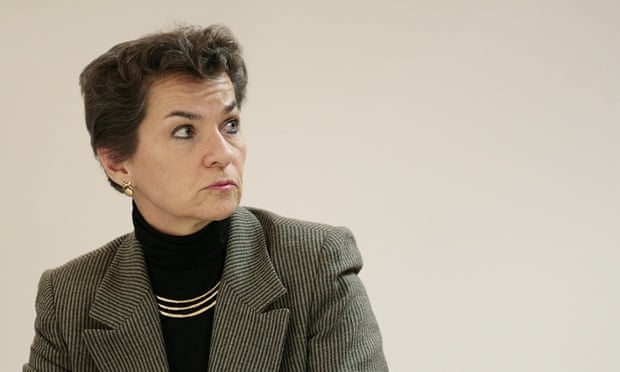Christiana Figueres, who heads up the global climate change talks, was visibly moved as she urged business leaders to take action to avoid runaway climate change at the World Economic Forum meeting in Davos on Thursday.
“This is the first generation that is becoming aware of what we have done, because the previous generation had no clue,” said the executive director of the UN Framework Convention on Climate Change. “We can’t blame them, we can’t blame ourselves because we’ve been put in this situation, but we do have a responsibility to do something about it and not to pass it on to the next generation.”
Looking at her daughter sitting nearby, Figueres’ eyes well up. Her desire to secure a meaningful climate deal later this year in Paris is clearly as much a personal concern as a global one.
While it is incumbent on the world’s politicians to secure a deal, it’s apparent they need help: just yesterday, the US Senate failed to pass resolutions acknowledging that climate change is the result of human activity. The private sector can play a pivotal role in giving politicians the confidence to act, Figueres said.
“I don’t think anybody can question the fact the role of business is fundamental, independently of [on] what side of the spectrum business stands,” she said.
Engagement from the private sector, Figueres says, needs to come in three forms: vision, action and voice.
Vision is about business leaders understanding the consequence of climate change for their companies and ensuring they align their operations with staying within a 2C rise in global temperatures.
Executives then need to think through what they need from governments at both national and international level in order to pursue that path.
“This is about vision, not short-termism,” Figueres said. “It’s not just about energy efficiency measures today, which represents only a tiny, tiny little first step. It’s about starting there but then understanding where we have to be over the next 50 years.”
Once companies have a clear destination, they need to focus on closing the distance between where they are now and where they want to be, she says. The final step is to become much more vocal about the need for transformational action.
“It is no secret that we have a very small number of corporations that are being very vocal, and that there’s a huge number of companies – the silent majority – that are not participating in this discussion and are not engaging with governments with respect to the very clear guidance and regulatory certainty that they need,” she said.
Figueres believes the lack of advocacy by companies is due to the fact that most of them still do not feel immediately threatened by climate change. In a PwC survey this week, global warming didn’t even make the list of CEO’s top priorities or concerns.
But Figueres warns that if executives continue to focus only on what’s in front of their noses, they will put their companies’ long-term survival at risk.
They can see that in the long run, having a stable planet and economic system is actually better for them in their operations and their business continuity, and that there is a huge opportunity for growth and for new profit, for new jobs, new industries and new technologies,” she said.
“But that is not compelling enough to actually have the CEO get up there and use his voice and leadership because the pain in the shoe is not enough. There is this abstract sense of yeah, we all want to be better off, but maybe somebody else should be doing something about that. In the meantime, I have my payroll to worry about.
Whereas those companies that are very active and do have a voice perceive that they’re immediately threatened.”
Businesses, regardless of their size, have largely failed to look deeply at the impacts of fossil fuels, she said: “They just use electricity and that’s the sum total of their engagement in this process.”
Despite the need for more action, Figueres said she was heartened by the number of major businesses that attended the climate change summit in New York last year, and in particular by the engagement by whole sectors, such as insurers and more progressive sections of the investment industry.
There has also been a sea change in the attitude from governments about the need to collaborate with the private sector.
“There has been quite an evolution in the understanding of the very positive contribution that the private sector can make,” she says. “I remember when I got to the secretariat five years ago that the private sector was a taboo word that never would have appeared in any text of governments. Yet now you have the text actually inviting quite openly the participation of corporations.
She acknowledged that there’s still a long way to go in what she calls “an evolutionary process”. But with just 10 months to go before the Paris talks open, Figueres also recognised the need for urgent action and referred to having a time bomb on our hands.
When one strips everything away, Figueres says that what business leaders need to do most is get in touch with their common humanity.
We speak of business as though there was a head there, a thinking brain, and that’s not so,” she says. “We have a role to play in life, whether that is being the head of a Fortune 500 company, or being a junior professional in an NGO, and we must step up to those roles.
“However, what cuts across all of those differences is the fact that we’re all human beings, all of us, and we all are either parents or aunts and uncles or grandparents and we all have a responsibility to the future.”

